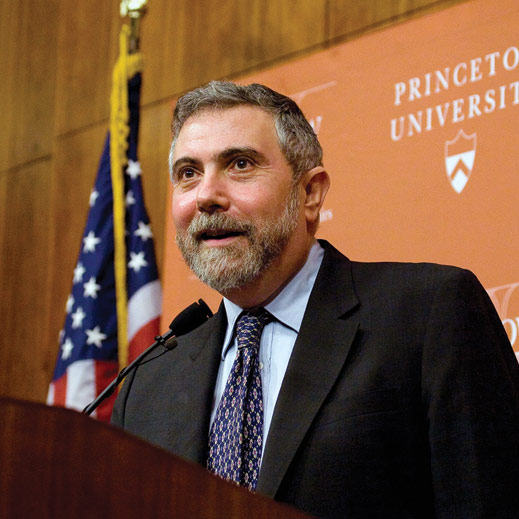Economist Paul Krugman is famous for being blunt. In June 2014 posts for his New York Times blog, Conscience of a Liberal, Krugman debunks analogies between climate change and the U.S. financial crisis; laments that “crazy people have de facto blocking power over policy”; and admits that “many people, including famous economists, are quite capable of being simultaneously cynical and self-righteous.”

And he credits MIT with helping create that style. “I take the kind of approach that translates economics into plain language,” he says. “Focus on the essence of the story, strip it down to the essentials, and try to avoid complexity to make it a clear exposition. It’s the style I was taught at MIT.”
Now Krugman, who taught at MIT for 18 years and at Princeton for 14 years, is applying his trademark candor at the City University of New York (CUNY). In July, he took on a nine-month term as a distinguished scholar at the Graduate Center’s Luxembourg Income Study (LIS) Center, and he will join CUNY’s faculty as a professor of economics in August 2015.
“It’s time to stop competing with the young guys creating the new economic models,” Krugman jokes. “At CUNY, I’ll be focusing more on public policy and income inequality. How to integrate data with different countries and how to communicate this data with public officials.”
LIS is a global data center for researchers, educators, and policy makers, helping them share cross-national comparisons on income, employment, and demographics and make them available for public use. The LIS Center at CUNY is its administrative satellite, and Krugman’s inequality-centered research will cover issues such as public policy with an eye toward general-interest publications.
“The Graduate Center is a remarkable locus of public-affairs-oriented scholarship,” Krugman wrote on his blog. “I couldn’t imagine a better place for me at this point; I also, to be honest, like the idea of being associated with a great public university.”
In addition to his role at CUNY, the Nobel laureate regularly updates his Times blog and is still a sought-after pundit on television programs like NBC Nightly News, Charlie Rose, and The Colbert Report.
“The economic crisis has been a near-perfect convergence of my careers,” he says. “My research that I’m most proud of focused on Japan’s prolonged stagnation in the 1990s. Now the U.S. is finding itself in a similar environment, and here I am with a platform to discuss it.”
Keep Reading
Most Popular
The problem with plug-in hybrids? Their drivers.
Plug-in hybrids are often sold as a transition to EVs, but new data from Europe shows we’re still underestimating the emissions they produce.
Sam Altman says helpful agents are poised to become AI’s killer function
Open AI’s CEO says we won’t need new hardware or lots more training data to get there.
An AI startup made a hyperrealistic deepfake of me that’s so good it’s scary
Synthesia's new technology is impressive but raises big questions about a world where we increasingly can’t tell what’s real.
Stay connected
Get the latest updates from
MIT Technology Review
Discover special offers, top stories, upcoming events, and more.